When chicken broth goes bad, it gives off a sour, rancid smell that you definitely won't want to ignore. Imagine the unpleasant aroma of rotting vegetables mixed with a hint of spoiled eggs—yuck! If you notice any weird smells like this, it's a sure sign you should toss that broth. Trust your instincts; your health matters. Fresh chicken broth should smell rich and inviting, bringing thoughts of cozy meals. If you're curious about how to keep your broth fresh or signs of spoilage, there's more handy information waiting for you!
Key Takeaways
- Bad chicken broth emits a sour, rancid odor reminiscent of rotting vegetables and may have a metallic hint.
- A faint smell of spoiled eggs can also indicate that the broth has gone bad.
- Fresh chicken broth should smell rich and inviting; unpleasant odors signal it is unsafe to consume.
- Spoiled broth often arises from poor-quality ingredients or bacterial growth due to improper storage.
- Trust your senses; if the broth smells off, it's best to discard it to avoid health risks.
Introduction
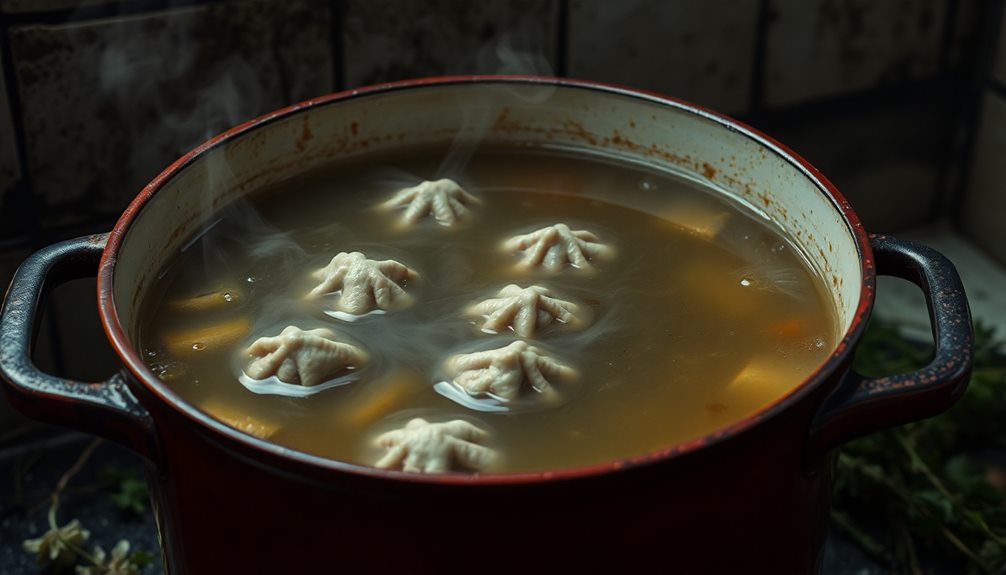
Have you ever opened a pot of chicken broth only to be greeted by an unpleasant smell? It can catch you off guard, right? You expect a warm, savory aroma, but instead, you get a whiff that makes you question your cooking skills.
Chicken broth is a kitchen staple, perfect for soups, sauces, and countless dishes. But when it goes bad, it can ruin your entire meal.
So, what causes that bad smell? Understanding this is key to keeping your broth fresh. Fresh chicken broth should smell rich and inviting, like a cozy hug. When it starts to sour, it's often due to bacteria or spoilage. Knowing how to identify these signs can help you avoid a culinary disaster.
You might wonder how to store your broth properly. Keeping it in the fridge or freezer can extend its life. Make sure to use airtight containers, too!
Description of the Smell
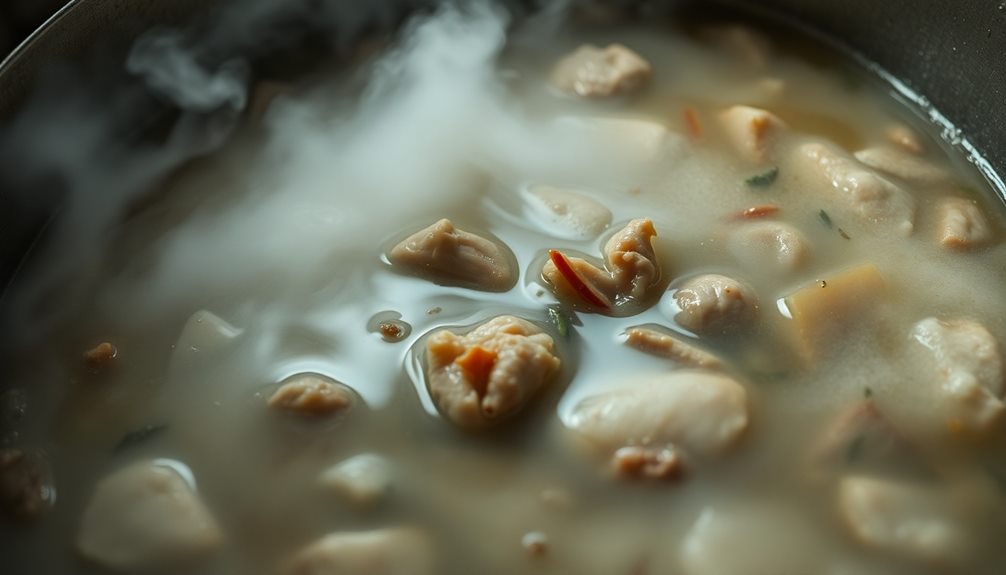
What does bad chicken broth smell like? Imagine walking into a kitchen where a pot of chicken broth has been simmering for too long. Instead of a warm, savory aroma that makes your mouth water, you're hit with a sour, almost rancid scent.
It's sharp and pungent, like rotting vegetables mixed with a hint of something metallic. You might even notice a faint smell of spoiled eggs lurking in the background.
This unpleasant odor can make you wrinkle your nose and step back. If you've ever accidentally left broth out too long or used chicken that's gone bad, you know that distinct smell can be truly off-putting.
It doesn't just smell bad; it also signals that the broth isn't safe to eat.
The moment you catch a whiff of this aroma, trust your instincts. Bad chicken broth isn't just about the taste; it's about your health too!
Source and Composition
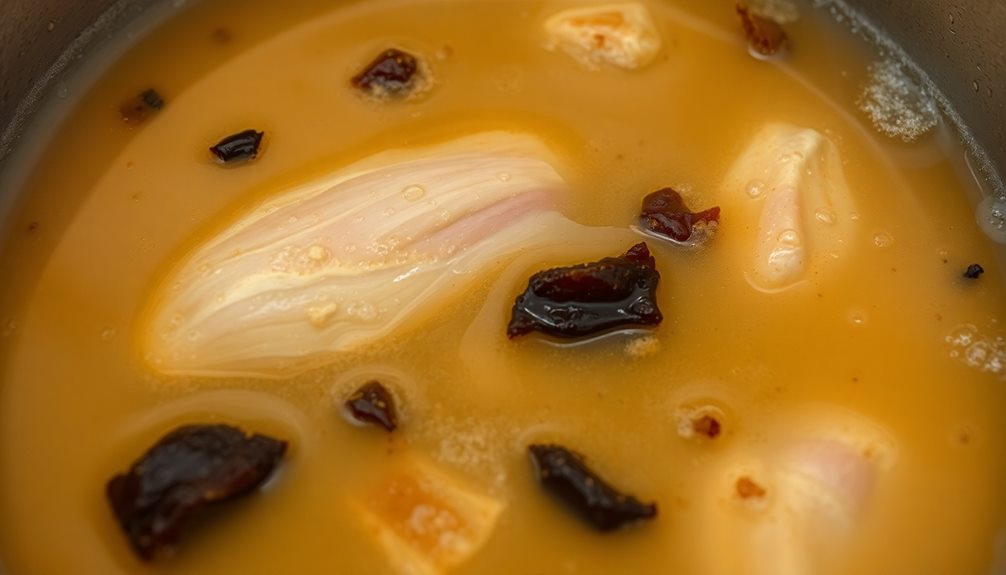
Often, bad chicken broth originates from using poor-quality ingredients or improper storage techniques. When you start with old or spoiled chicken, you're setting yourself up for disaster. Fresh chicken is key; it should look pink and moist, not gray or slimy. The same goes for vegetables like carrots and onions—if they're wilting or have dark spots, toss 'em out!
Improper storage can also wreak havoc. If you leave your broth sitting out too long, bacteria can grow, making it smell sour or rotten. Always refrigerate leftover broth within two hours to keep it fresh. If you want to store it longer, freeze it in airtight containers; that way, you can enjoy it later without worry!
Additionally, spices and herbs can play a role. Old or stale seasonings can give your broth a funny smell too. You want your broth to smell savory and inviting, not off-putting.
Typical Scenarios or Environments
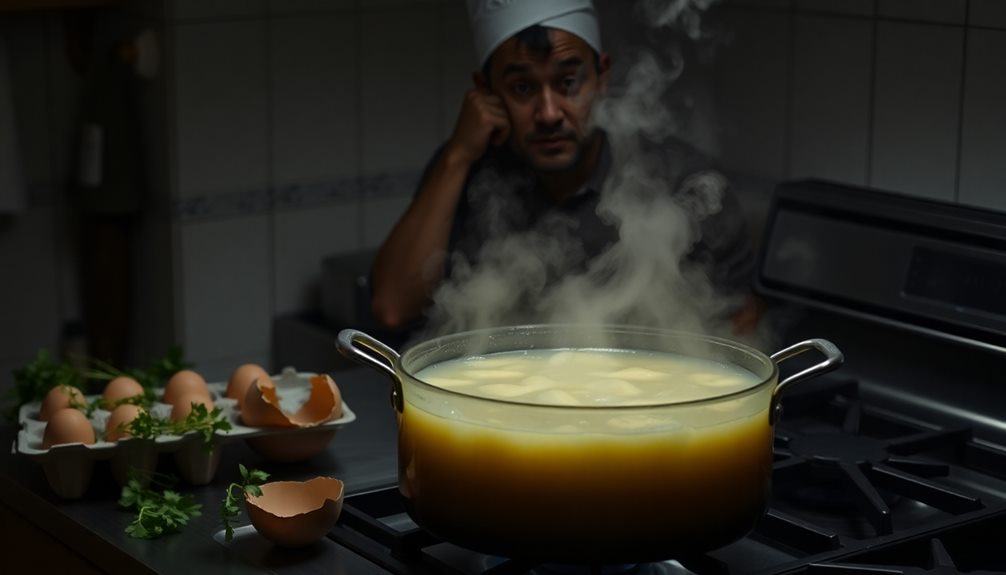
Certain kitchen environments can greatly influence the smell of chicken broth. If you're cooking in a cluttered, poorly ventilated kitchen, the smell can turn sour quickly. Stale air traps unwanted odors, making your delicious broth smell off.
Imagine you're in a cozy, bright kitchen with windows wide open. Fresh air flows in, mixing with the savory scents of garlic and herbs as you simmer your chicken. This environment encourages uplifting aromas, making your broth smell divine.
In contrast, if you're working in a cramped space filled with old food containers, you might encounter a nasty smell instead.
Another scenario is when you're using chicken that's been in the fridge too long. Even the best kitchen setup can't save a broth made with spoiled chicken. You'll notice that unmistakable pungent odor as soon as you start cooking.
Emotional or Cultural Associations
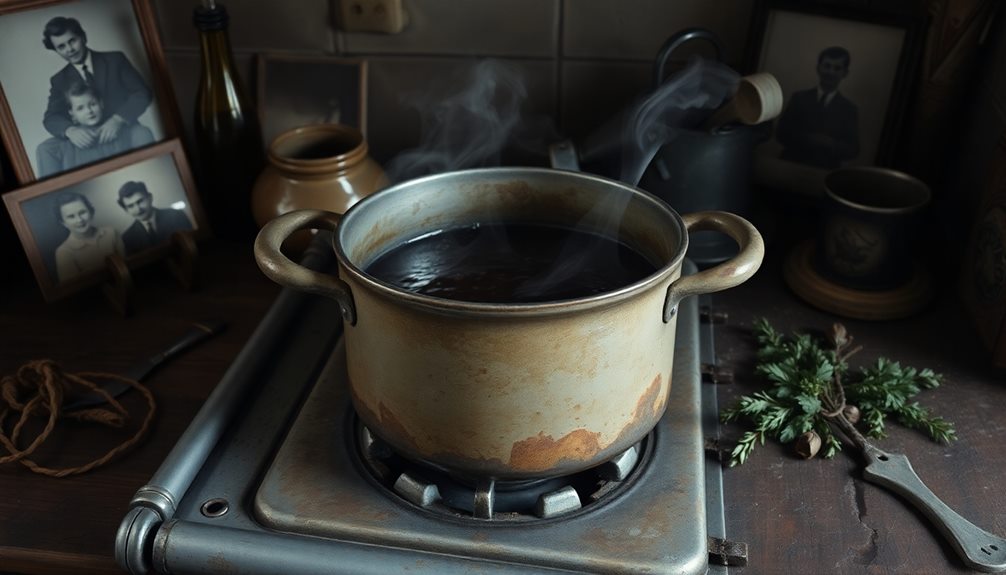
Chicken broth frequently evokes strong emotional and cultural associations, connecting you to cherished memories and traditions.
Think about the times you've gathered around a warm bowl of broth with family or friends. That comforting smell can remind you of Sunday dinners at Grandma's house, where her homemade chicken soup warmed your heart as much as your belly.
In many cultures, chicken broth symbolizes care and healing. When someone's feeling under the weather, a pot of broth is often the first remedy offered. It's like a warm hug in a bowl, filled with love and nurturing intentions.
You might remember those cozy rainy days when your mom or dad would whip up a batch, filling the house with a delicious aroma that promised comfort.
Each sip of broth might transport you back to celebrations, family gatherings, or even quiet moments of reflection. This simple dish carries stories, traditions, and feelings that bind us to our roots.
Health or Safety Considerations

While enjoying a bowl of chicken broth can be soothing, it's crucial to consider health and safety aspects to avoid any unpleasant experiences.
First, always check for signs of spoilage. If your broth smells sour or rancid, it's best to toss it out. Bad smells often indicate harmful bacteria, which can lead to food poisoning. Trust your nose—if it doesn't smell right, don't risk it!
Next, pay attention to how long you've stored your broth. Homemade chicken broth should be refrigerated and consumed within three to four days. If you're not planning to use it soon, freeze it! This keeps it fresh and safe, allowing you to enjoy it later without worry.
When reheating, make sure the broth reaches at least 165°F. This helps kill any lingering bacteria that might've developed over time.
And remember, never leave broth out at room temperature for more than two hours.
Final Thoughts
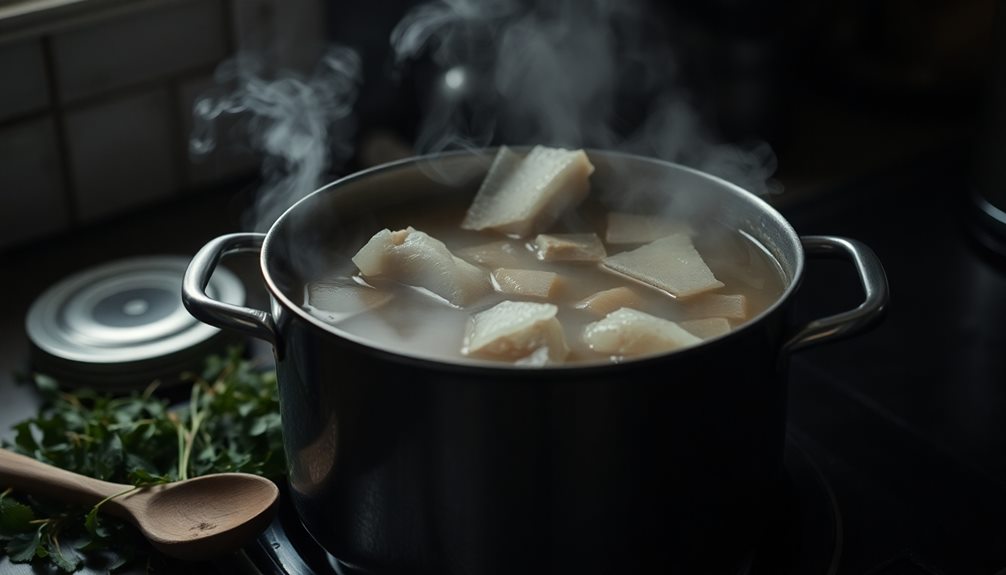
Ultimately, the enjoyment of chicken broth hinges on its quality and safety. When you open a pot of broth, you should be greeted by a warm, savory aroma that makes your mouth water. If instead, you catch a whiff of something sour or off, it's time to pay attention. Bad chicken broth can spoil your meal and even pose health risks.
Remember to trust your senses! A good broth smells rich and inviting, while a bad one can have a pungent, unpleasant odor. If it smells bad, it's best to toss it out—no one wants to risk food poisoning.
So, whether you're making your own broth or buying it from the store, always check the expiration date and give it a sniff. Your taste buds will thank you, and you'll enjoy your soups, stews, or sauces much more.
Keep these tips in mind, and you'll be a chicken broth connoisseur in no time. Enjoy the process of cooking, and don't hesitate to experiment with flavors. After all, good chicken broth can be the heart of many delicious dishes, bringing comfort and warmth to your table!
Frequently Asked Questions
Can Bad Chicken Broth Cause Food Poisoning?
Yes, bad chicken broth can definitely cause food poisoning. If you consume spoiled broth, harmful bacteria may lead to symptoms like nausea, vomiting, and diarrhea. Always check for freshness before using any broth in your meals.
How Long Can Chicken Broth Be Stored Safely?
You can safely store chicken broth in the refrigerator for about 3 to 4 days. If you freeze it, it lasts up to 6 months. Always check for signs of spoilage before using it.
What Are Common Signs of Spoiled Broth Aside From Smell?
Aside from smell, you should look for changes in color, texture, and the presence of mold. If the broth appears cloudy or has an off consistency, it's best to discard it to avoid potential illness.
Can You Salvage Bad Chicken Broth With Seasoning?
You can't always salvage bad chicken broth with seasoning. While herbs and spices might mask some flavors, they won't eliminate spoilage. If it tastes off, it's safer to discard it and start fresh.
Is It Safe to Taste Questionable Chicken Broth?
You shouldn't taste questionable chicken broth. If it smells off or shows signs of spoilage, it's safer to discard it. Trust your instincts—better to be cautious than risk foodborne illness from potentially harmful bacteria.









